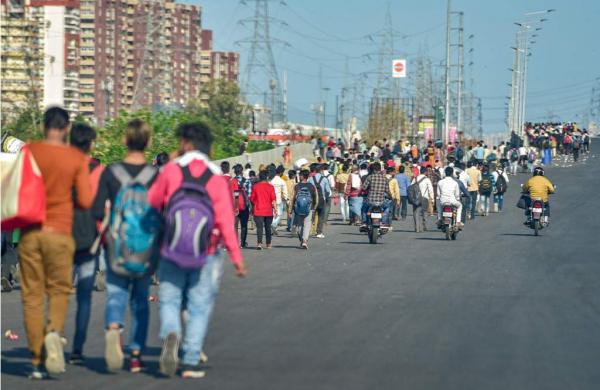This article is written by Nishank Govil who is pursuing a Diploma in Labour, Employment, and Industrial Laws (including POSH) for HR Managers from LawSikho.
Table of Contents
Introduction
According to Article 21, No person shall be deprived of life and liberty, except procedure established by law, nor shall any person be denied equality before the law or equal protection of the laws within the territory of India. This fundamental right considers every individual to be equal before the eyes of law and provides protection to anyone, whether Indian or foreigner against deprivation of life and liberty by the state.
Migrant workers in India, have remained the backbone of the Indian economy, despite being highly vulnerable in terms of physical and mental health. However, the lockdown situation in the country because of the outbreak of coronavirus, has put them in a precarious condition. On one hand, they have lost their jobs, while on the other, they don’t have money to survive at their native place. This sudden lockdown has deprived these migrant workers of their right to life & liberty, which is against article 21. As a result, the nation witnessed mass exodus, of these migrant workers going back to their native places. Due to the lack of transport facility they have to walk thousands of kilometres, without food & shelter and many have succumbed to death in the process.
Though the lockdown was inevitable step by the government, in order to check the spread of the coronavirus but had it been done keeping in mind the situation of these migrant workers, we would have saved lives of many migrant workers who died last year.
Challenges faced by migrant workers
Many migrant workers lost their jobs during the lockdown, which was their only source of income. Due to lack of job these distressed workers have to come back to their hometown without any job, shelter, food & transportation. Around 1.14 crores migrant workers migrated to their hometown since 25th March 2020. During their travel many have faced the brutality of police, in one incident a migrant worker from Orissa succumbed to death, being beaten by the police on account of violating social distancing norms. On 8th May 2020, a freight train killed 16 migrant workers who had stopped to rest on railway tracks near Aurangabad in Maharashtra. On 14th May, eight migrant workers were killed and nearly 55 injured when the truck they were in collided with a bus near Guna, Madhya Pradesh. According to data collected by SAVELIFE FOUNDATION, an NGO working in road safety, 198 migrant workers were killed in road accidents, as of 2nd June 2020. According to recent reports there have been approximately 1,000 deaths of migrant workers reported due to various reasons like starvation and financial distress, lack of medical care, road and train accidents, suicides, police brutality, etc.
Another major challenge faced by the migrant worker is unemployment. According to Centre for monitoring Indian economy (CMIE), when the lockdown was first imposed in March 2020, the unemployment rate rose to 8.8% from 7.8% in the previous month. This rate went as high as 23.5% in April 2020 and slightly reduced to 21.7% in May. On May 29th, 2020, a 50-year-old man, working in a hotel in shahjahanpur district (UP) allegedly committed suicide by jumping in front of a train, leaving behind his wife, mother & four children. He mentioned in his suicide note that he was left penniless after losing his job due to lockdown and was unable to buy other essential commodities, such as sugar, salt and milk. In another incident two young men aged 22 and 20, working in Delhi & Mumbai respectively committed suicide on May 27th.
Reports show that the migrants were not able to leave the city and had to struggle to get food and shelter. As many as 16000 people filled 220 shelter homes in Delhi last year. The number kept on increasing but these shelter homes didn’t have enough space to accommodate them. All shelter homes were overcrowded, breaking the protocol of social distancing norm. On 4th May 2020, in Surat, 100 of migrant workers seeking to return to their home were arrested by police during a protest demanding travel arrangements to return to their home. On 11th May 2020, a few migrant workers were beaten and killed by Bangalore police at KG Halli police station who requested the Karnataka government to make arrangements for their return to their hometown Uttar Pradesh.
Government response to the problems faced by Migrant Workers
Seeing the onslaught of so many migrant workers struggling to go back to their hometown, the government decided to engage 2600 Shramik Special Trains from May 1st 2020, for transportation of these migrant workers stuck in various parts of the country. However, the ministry decided to charge Rs. 50 extra from each passenger along with the sleeper class fare, adding an additional burden on these stranded migrant workers. The railways also informed the local authorities to give food packets & water bottles to these travellers at the originating station, for every 12 hours journey. But the poor planning and execution of these trains led to several instances of trains destined for one state taking circuitous routes through other distant states, causing inordinate delays and leaving passengers baffled.
On May 23th, around 40 workers left Khizrabad after successfully registering themselves for the Shramik Special supposed to leave from Delhi’s Anand Vihar railway station for Bihar that afternoon. They had to first go for a medical screening at a nearby health check-up point set up by the Delhi government, following which they were taken in buses to the railway station. The group got delayed during the medical check-up, and they were asked to board a different train that was also going to Bihar, but to a different district called Purnia, nearly four hundred kilometres from Chhapra. The 24-hour route took 38 hours to reach the destination, keeping the travellers without sufficient food & water. Another train from Panvel to Jaunpur (UP), was held for 10 hours in Varanasi. Yet another incident claims that the food served in a train going from Gujrat to Bihar, was rotten.
In late March, the Uttar Pradesh government decided to arrange busses from Delhi to take migrants back to their villages for free but then seeing the number of migrants they started charging fees for travelling. The busses were in a poor condition and the busses being overcrowded with migrant workers, social distancing was impossible to be followed and the busses were not sanitized as well.
On May 16th, the government started National Migrant Information system (NMIS), to maintain a central repository of migrant worker and facilitate smooth movement of these workers to their native place. Though it can track the information of those workers who travelled through the arrangements made by the government but can’t track the information of those workers who travelled by foot or some other means.
Suggestions
During the entire lockdown phase the group that suffered the most is the migrant workers. Article 21 of the Indian Constitution states Right to Life and Liberty is one of the fundamental rights given to every human being in the country and it has to be protected especially in case of these migrant workers who are socially and economically weak to fight for their own rights. The problems mentioned above are just few of the atrocities faced by these migrant workers last year and continues to remain same this year as well as the country goes through the second wave of the coronavirus.
As per section 23, of the Inter-State Migrant Workmen (Regulation of Employment and Conditions of Service) Act, 1979, all the inter-State migrant workers are required to be registered with the Government and the principal employer and the contractors have to maintain a register for the same. Had this act been implemented properly we could have the details of these migrant workers coming from different states. Rather the government accepted their failure to maintain this data in the parliament. Having this data would have been a crucial precursor in planning the lockdown as it would have greatly helped the state governments to smoothly plan the movement of these migrant workers to their respective states. Not only the government can track the movement of these workers but also plan for adequate shelter homes & arrange food for them even before the implementation of lockdown, at the same time maintaining the protocol of social distancing.
Considering the fact that the lockdown was necessary, and such chaos was expected, but it can be controlled to a lot extent if we had proper data of these migrant workers. The government has to make strict laws to ensure that this data is maintained by the employers and the contractors. Unfortunately, the reality is many employers do not maintain this data, in order to avoid the compliance burden. Though the new code on wages, 2019 has made the compliances simpler for the employer and also introduced a new concept of Inspector cum facilitator who will not only ensure the implementation of the compliances but also advice the employer in maintaining them. Hope the government will learn a lesson from last year’s chaos & avoid it to repeat again in the upcoming third wave of coronavirus.
Students of Lawsikho courses regularly produce writing assignments and work on practical exercises as a part of their coursework and develop themselves in real-life practical skills.
LawSikho has created a telegram group for exchanging legal knowledge, referrals, and various opportunities. You can click on this link and join:
 Serato DJ Crack 2025Serato DJ PRO Crack
Serato DJ Crack 2025Serato DJ PRO Crack











 Allow notifications
Allow notifications


